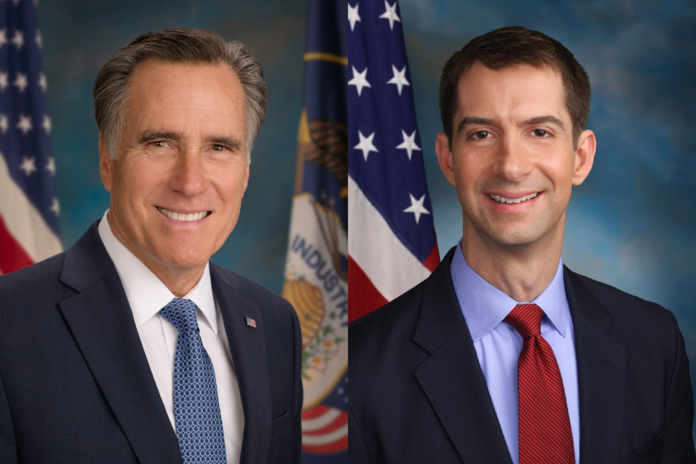Tom Cotton and Mitt Romney are something of an odd couple. Cotton is perceived as one of the most conservative voices in the Senate, and most view Romney as a moderate.
But earlier this week, the duo unveiled a proposal to raise the federal minimum wage, with a caveat that E-verify requirements must be imposed to ensure the increase will only go to legal workers.
The Higher Wages for American Workers Act calls for raising the minimum wage to $10 by 2025. Other provisions include slower phase-ins for businesses with fewer than 20 employees, and increased penalties for employers that violate immigration paperwork requirements.
“American workers today compete against millions of illegal immigrants for too few jobs with wages that are too low — that’s unfair,” Cotton said in a statement. “Ending the black market for illegal labor will open up jobs for Americans. Raising the minimum wage will allow Americans filling those jobs to better support their families. Our bill does both.”
Romney explained the bill’s intent to decrease illegal labor.
“Our bill would protect American jobs by requiring employers to use E-Verify to ensure that businesses cannot hire illegal immigrants,” the Utah Republican said. “We must create opportunities for American workers and protect their jobs, while also eliminating one of the key drivers of illegal immigration.”
The Foundation for Economic Education’s Brad Polumbo is not convinced; he says the senators abandoned fiscal conservatism.
“A recent review of minimum wage research found clear, consistent results that showed job losses from minimum wage hikes and that this unemployment was disproportionately borne by teenagers, minorities, and less-educated workers,” the libertarian wrote. “So, too, financial experts have warned that after a year of crushing COVID-19 lockdowns and riots, a minimum wage hike would spell death for small businesses.”
Polumbo isn’t wrong, but the plan is far better than what economically illiterate Bernie Sanders types push or President Joe Biden’s hyper-partisan COVID bill.
Unfortunately, despite a century’s worth of evidence showing its bad consequences, the general public has been brainwashed on the topic.
“It’s something that should resonate with the public. Minimum-wage hikes, including big ones, are unfailingly popular; E-Verify has lopsided support in opinion polls as well,” National Review’s Robert Verbruggen opined Tuesday. “And it’s a good deal for immigration-restrictionist conservatives, because the wage hike is relatively modest while the immigration reform is substantial. The haunting questions are how many Democrats could support this without major changes and just how furious the business wing of the GOP will be.”
Any federal minimum wage is arguably unconstitutional and a market imposition that hurts our most vulnerable. Pay is not determined by the strenuousness of your job; if it were, farmers and pipeline technicians would own Lake Superior mansions. Honest work is admirable, but supply and demand laws reign.
Professors think patrons should pay similar amounts for their insipid lectures as an NHL game, but that’s fictional.
Biden and his vice president are fiscally ignorant, yet they should know the nonpartisan Congressional Budget Office recently reported nearly four million jobs could be lost if we increased the federal minimum wage to $15, and it “would have two principal effects on low-wage workers” who “would become jobless, and their family income would fall – in some cases, below the poverty threshold.”
Minimum wage jobs aren’t supposed to be career choices; they’re stepping-stones. More than half of minimum wage earners are under 25, and very few are their family’s main breadwinner. And since facts matter, fewer than two percent of hourly American workers earn $7.25 per hour. Most are young and reside in low cost-of-living states. It goes without saying that Bemidji is not San Francisco.
Fast food workers in North Dakota would quickly be unemployed if the mandated wage suddenly doubled. They’d also be earning similar annual salaries higher to government employees with college degrees in their states. How long will unions tolerate that?
A minimum wage hike retards ambition and is a simplistic concept that, like most left-wing policies, is detrimental to those it purports to help. Places like California have the highest minimum wage and also highest poverty rate in America. Correlation?
For what it’s worth, Sen. Josh Hawley decided to make his own proposal one day after his colleagues’. Employees earning less than the median wage would receive a quarterly “Blue-Collar Bonus” tax credit worth half the difference between their hourly wage and the median.
Manhattan Institute fellow Brian Riedl deemed the Cotton/Romney plan “the most realistic bipartisan coalition.”
“I think the Hawley proposal may be too complicated to be realistically implemented without some unforeseen side effects,” he said.
Thursday night it was ruled the $15 per hour minimum wage must be removed from the COVID-19 relief bill.
As for the Cotton/Romney bill, credit them for trying to move legislation rather than seeking cable news appearances, even if it’s a long shot.
A.J. Kaufman
A.J. Kaufman is an Alpha News columnist. His work has appeared in the Baltimore Sun, Florida Sun-Sentinel, Indianapolis Star, Israel National News, Orange County Register, St. Cloud Times, Star-Tribune, and across AIM Media Midwest and the Internet. Kaufman previously worked as a school teacher and military historian.

















